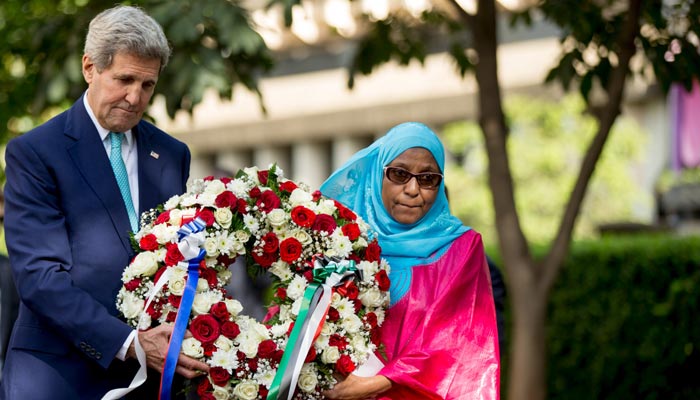John Kerry participates in a wreath-laying ceremony with Rukia Ali, a victim of the 1998 US embassy bombing, at the August 7 Memorial Park, in Nairobi on Monday.
AFP/Nairobi
US Secretary of State John Kerry held talks with Kenyan President Uhuru Kenyatta on Monday on security cooperation, after calling for unity in the face of terror attacks.
Kerry's trip to the east African nation is the first high-level visit since 2012, and comes after years of tensions surrounding Kenyatta after he was charged by the International Criminal Court for crimes against humanity.
The ICC has since abandoned the case against Kenyatta over his alleged role in the 2007-2008 post-election violence, citing a lack of evidence and Kenya's failure to cooperate - somewhat removing Kenyatta's pariah status.
Few details of the meeting were given, but diplomats earlier said Kerry would raise human rights issues with Kenyatta, whose government has been accused of clamping down on civil society groups and the press.
Kerry and Kenyatta met for around half an hour, with the Secretary of State saying it was a "good meeting". The US envoy was also meeting opposition leaders.
Earlier he visited a memorial in Kenya to the 1998 bombing of the US embassy. The attack by Al-Qaeda was the worst carried out by Islamist militants against the east African nation, killing 213 people.
"The terrorists who struck on August 7, 1998 failed utterly in their purpose, which was to implant fear in the hearts of the Kenyan people and to divide America from the citizens of this country," Kerry said.
"They failed for the same reason that terrorists will always fail. Yes they can reduce a building to rubble, and yes they can even deprive innocent people of their lives, but they do not give anyone anything of what really makes life worthwhile."
Heading to Saudi Arabia, France
Last month Al-Qaeda-affiliated Shabaab gunmen massacred close to 150 people, mostly students, in a raid on a university in the northeastern Kenyan town of Garissa.
‘Sorrow, outrage’
The raid followed a string of other massacres in the northeast and Muslim-majority coastal areas, and after the September 2013 siege of the Westgate shopping mall in Nairobi which left at least 67 dead.
"We know that the struggle in which we are all engaged now is not going to be over soon - nearly two years ago at Westgate mall, five weeks ago at Garissa university and at other times," the top US diplomat said.
"Words are not sufficient to express our sorrow, our outrage, or our wish that we can somehow reverse time and bring all the victims back."
Kerry arrived in Kenya on Sunday for talks on security cooperation and ahead of US President Barack Obama's visit to his late father's home country.
But the fight against Somalia's Shabaab militants features high on the agenda, with Kenya struggling to stop increased cross-border attacks by the militants even though it has thousands of troops in southern Somalia, as part of an African Union force.
Kerry, who arrived from Sri Lanka on Sunday afternoon, leaves on Tuesday for the Horn of Africa nation of Djibouti, where the US has a major military base, and where refugees from war-torn Yemen are arriving.
Kerry then heads to Saudi Arabia and France for talks on regional security, as well as to take part in commemorations marking the end of World War II in Europe.

